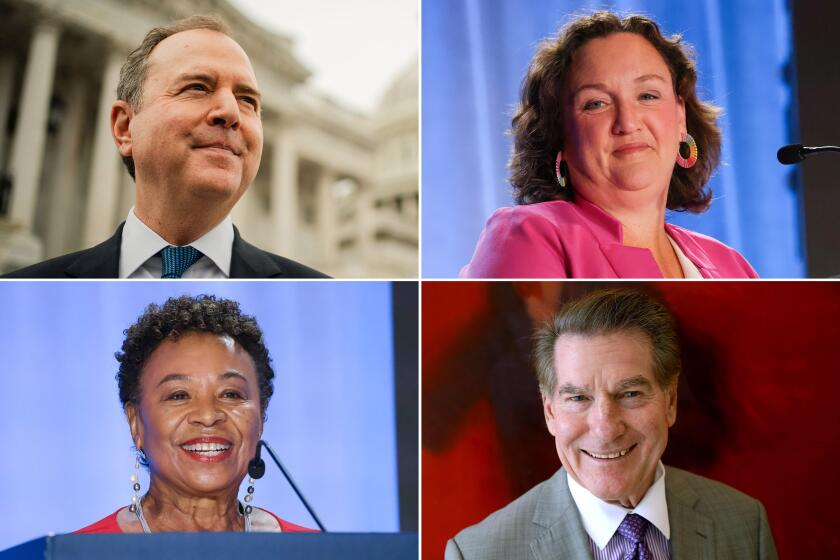Column: A climate voters’ guide to the California Senate election
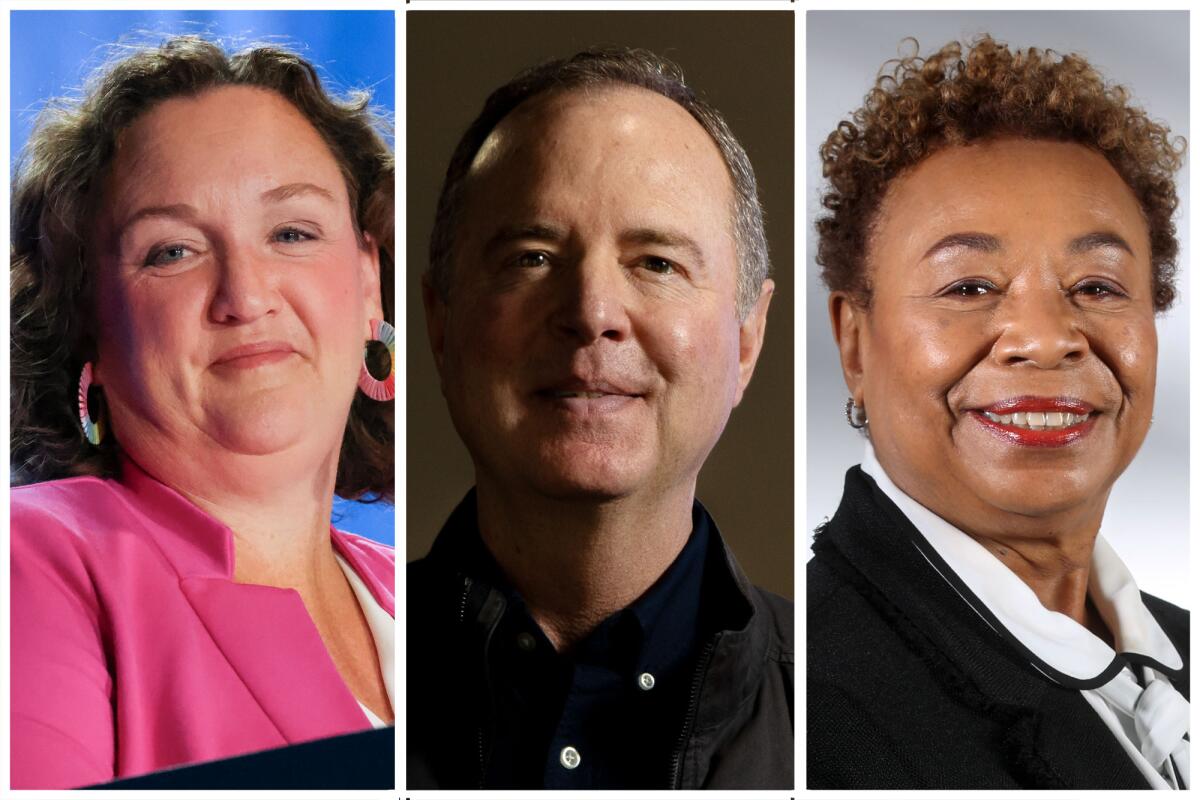
- Share via
If you live in California and confronting the climate crisis is one of your top priorities, I wouldn’t blame you for not knowing whom to vote for in the U.S. Senate primary election.
With ballots already sent via mail and March 5 the last day to vote, the leading candidates have had hardly anything to say about global warming, even as it upends the lives and livelihoods of millions of Californians. That lack of climate focus includes not only Republican Steve Garvey but also the Democratic front-runners — Barbara Lee, Katie Porter and Adam B. Schiff.
With an eye toward helping climate-conscious voters make their choice, I chatted with the three Democrats, all of whom serve in the House of Representatives. (Garvey’s team never got back to me.) Our conversations were brief — 15 to 20 minutes each.
Before getting on the phone with the contenders, I did my homework.
You're reading Boiling Point
Sammy Roth gets you up to speed on climate change, energy and the environment. Sign up to get it in your inbox twice a week.
You may occasionally receive promotional content from the Los Angeles Times.
Let’s start with Schiff, who built a national profile through his starring role in President Trump’s first impeachment trial.
The Burbank Democrat’s website describes him as a Green New Deal co-sponsor who has helped grow public transit networks in Southern California and fought to expand the Santa Monica Mountains National Recreation Area. At a debate last month, he told viewers he had “taken on oil companies and prosecuted them” during his years as an assistant U.S. attorney.
Porter, who hails from Orange County, had a different message at the debate.
She told viewers that Schiff “may have prosecuted big oil companies before he came to Congress, but when he got to Congress, he cashed checks from companies like BP — from fossil fuel companies.” Porter played up her well-earned reputation for grilling corporate executives, noting she had introduced a bill to “raise the rate on polluters when they drill on our public lands.”
That bill was signed into law by President Biden as part of the Inflation Reduction Act, as Porter alludes to on her website.
Lee’s climate focus has been environmental justice — cleaning the air and water in low-income neighborhoods and communities of color that have suffered the most from industrial pollution and are now bearing the brunt of the climate crisis.
The Oakland Democrat’s website says she has “fought to hold fossil fuel corporations who knowingly destroy our planet for short-term profits accountable by supporting legislation to ban offshore drilling, raising taxes on corporate polluters’ fossil fuel income and wealth, and ending new federal fossil fuel infrastructure permits.” Like Porter and Schiff, Lee is a Green New Deal co-sponsor.
So in a nutshell — reasonable talking points all around, but not a lot of depth from any of the candidates.
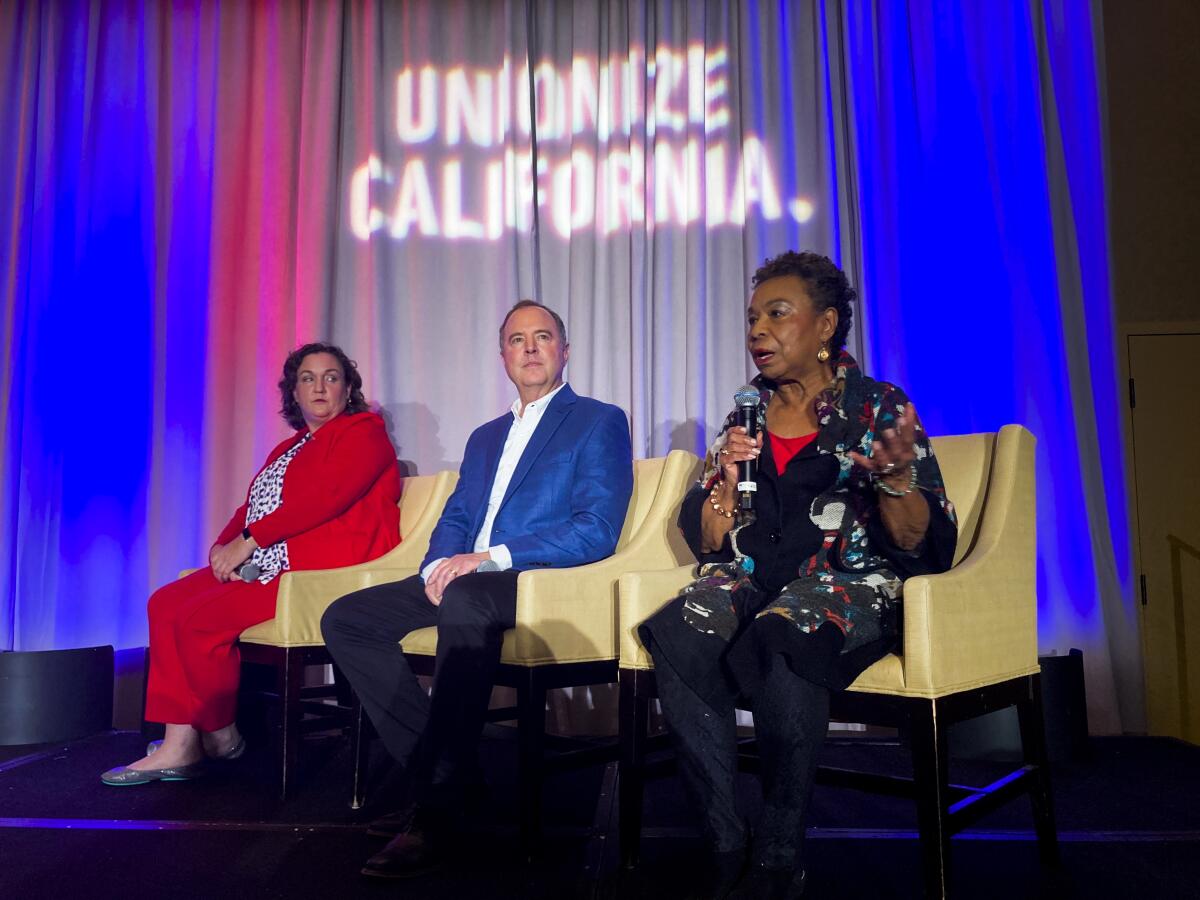
I also spoke with several prominent climate advocates who have followed the Senate race. Most of them offered a version of the same message: None of the three Democrats is a climate champion. But none of them is problematic either.
RL Miller, who founded the political action committee Climate Hawks Vote and previously chaired the California Democratic Party’s environmental caucus, told me she expects all three candidates would be “good if not phenomenal” in the Senate.
The only 2024 statewide electoral contest is for Senate and includes Reps. Katie Porter, Barbara Lee and Adam B. Schiff along with former Dodger Steve Garvey.
Porter, she said, would likely use her trusty whiteboard to do battle with fossil fuel industry executives, excoriating them at Senate hearings for prolonging the climate crisis. Lee, on the other hand, would likely highlight “toxic pollution and the health impacts to Black, brown and underserved communities,” with a Chevron oil refinery just outside her House district top of mind.
Miller told me she has “less of a handle” on Schiff because most of his environmental work has been local rather than national or statewide. She did note that Schiff signed the “no fossil fuel money” pledge last year — joining Lee and Porter, both of whom had previously committed to not accepting campaign contributions from coal, oil and gas companies.
Schiff “would be a fairly mainstream Democratic voice in the Senate,” Miller predicted.
Fran Pavley was more enthusiastic about Schiff, who currently leads in the polls.
Pavley — a former state lawmaker who wrote several landmark climate laws and is currently environmental policy director at USC’s Schwarzenegger Institute — actually endorsed Schiff. When I asked her why, she cited his political acumen and his legal smarts, saying both would be valuable on climate. She also highlighted his local environmental work, including his continued efforts to protect 191,000 acres encircling the San Fernando Valley through the Rim of the Valley Corridor Preservation Act.
Pavley did acknowledge that Schiff, like the other candidates, has not made climate a priority — yet.
“It’s all about who you hire,” she said.
It also stood out to me that at last month’s debate, Schiff was the only candidate who wholeheartedly defended Gov. Gavin Newsom’s plan to end the sale of new gasoline-powered cars by 2035 — although Lee and Porter didn’t exactly reject it.
Asked about Newsom’s plan, Lee said there are “20 million people in California living one paycheck away from poverty who may not be able to afford” electric cars. As a senator, she said, she would “make sure that low-income people, working families are at the table when these climate policies are developed,” to make sure those families can afford clean vehicles.
Porter took a similar stance.
“New cars are a lot of money. So if we’re going to have rules that prompt people to move toward greener energy, then we need to have programs to assist them to get there,” she said at the debate.
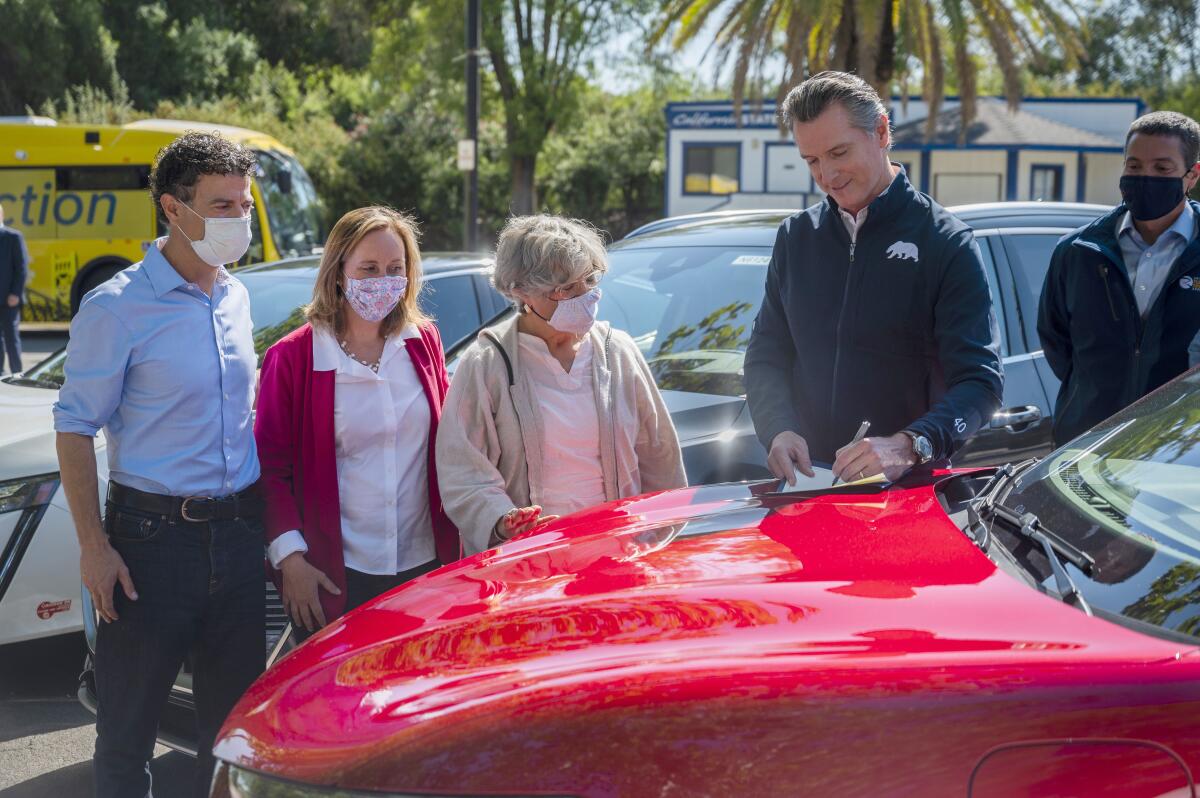
The advocacy group California Environmental Voters, known for its scorecards grading politicians, hasn’t endorsed in the Senate primary. Mary Creasman, the group’s chief executive, told me the three Democrats all have strengths: Lee is a powerful voice for environmental justice; Porter is good at calling out corporate polluters; Schiff has a track record on protecting public lands.
But none of the candidates has articulated a bigger, bolder vision for tackling the dangers posed by global warming. Much of the world looks to California to lead the way on climate, and the state’s next senator needs to recognize our unique role.
“You can’t have one niche area when it comes to an existential crisis that affects all of our future,” Creasman said.
OK, so at this point you’re probably wondering what the candidates had to say when I talked with them.
To start, all three Democrats described climate as one of their top three priorities.
Porter expressed frustration with the total lack of climate questions at this week’s debate, telling me she was “super mad.” Lee said she hears constantly from young people who are “afraid that they won’t have a habitable planet to live on.” (I count myself among those young people.) Schiff clearly understands the stakes, too.
California’s primary election takes place on March 5. Read up on the races in L.A. city, L.A. County and other areas.
“If we don’t get climate change right, then none of the other problems are going to matter very much at the end of the day, because we’re going to be on fire or underwater,” he said.
All three candidates told me they support President Biden’s goal of powering the nation with 100% clean electricity by 2035 — a decade ahead of California’s target. Asked how we can accelerate the transition to solar panels, wind turbines and other climate-friendly energy technologies, Porter said federal agencies need to make consumer tax credits easier to access — and move more quickly to roll out rebates for electric heat pumps and induction stoves from the Inflation Reduction Act.
“I voted for that bill a year and a half ago. We cannot keep allowing bureaucracy as usual to block this,” she said.
Porter and Lee both confirmed that they support Newsom’s plan to end the sale of new gasoline cars in California by 2035, even as they think the federal government should do more to bring down the cost of electric cars and make sure everyone can access charging stations. Lee added that ensuring a “just transition” for fossil fuel workers is key, too.
“Transitioning to a green economy could mean people would lose their jobs. I don’t want to see that happen,” she said.
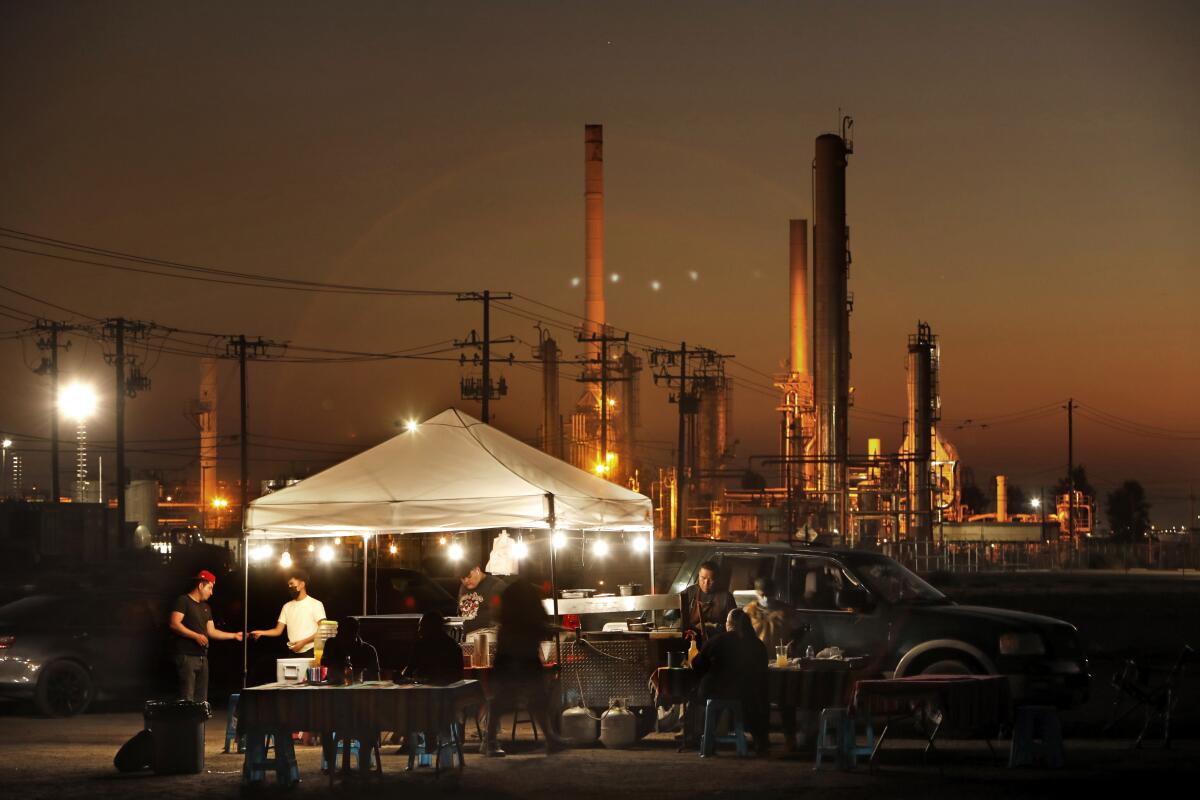
Schiff offered similar views on electric vehicles and appliances, lamenting that gas stoves — which not only spew heat-trapping carbon emissions but also fill our homes with lung-damaging particles — have become “part of the right’s cultural warfare.” He also alluded to the beef industry’s role in fueling global warming — and the potentially helpful role of fake meats.
“Changing how we produce our food, providing alternate proteins, is also part of the answer,” he said.
Schiff also called for more federal support for long-distance transmission lines, to move solar and wind energy from where it’s generated to where it’s used — a controversial notion for some environmental activists, who consider rooftop solar systems far superior to sprawling solar and wind farms that can tear up wildlife habitat. But as I’ve written previously, we don’t have nearly enough rooftops to meet all of modern society’s energy needs — a reality Schiff acknowledged.
“You can’t generate all the energy you need in the same places where you’re going to use it,” he said. “If we make it too difficult to deploy renewable energy, then we will be watching the waters come up around our ankles, our knees and our heads.”
True to her history of prioritizing environmental justice, Lee homed in on the housing-climate-transportation nexus.
California, she told me, can’t just promote renewable energy and electric cars. We also need more sustainable neighborhoods where public transit, protected biking and walking paths and affordable housing exist side by side. She said she helped secure federal money for mixed-use developments called “transit villages,” including one in Oakland’s Fruitvale neighborhood.
“We have to make sure that we don’t leave anyone behind based on economics or where they live,” she said.
Porter, meanwhile, told me that California buses a smaller fraction of public school students than any other state, and that more buses could reduce air pollution from idling cars at school pickup lines. She also emphasized the importance of building more housing in transit-rich cities, and not just propping up sprawling suburbs that require long freeway commutes.
Porter knows firsthand the value of housing within walking distance of work. She used to walk to her law professor job at UC Irvine from a house that was built on the university campus, in part to help teachers like herself afford local housing.
“I want to see us think creatively about what transit looks like,” she said. “It may mean rail. It may mean traditional bus lines.”
Schiff was similarly gung-ho about public transit systems that help people ditch their cars, telling me we have to “invest more in first-mile, last-mile solutions” that help people make it home from metro stations, such as tax credits for electric bikes.
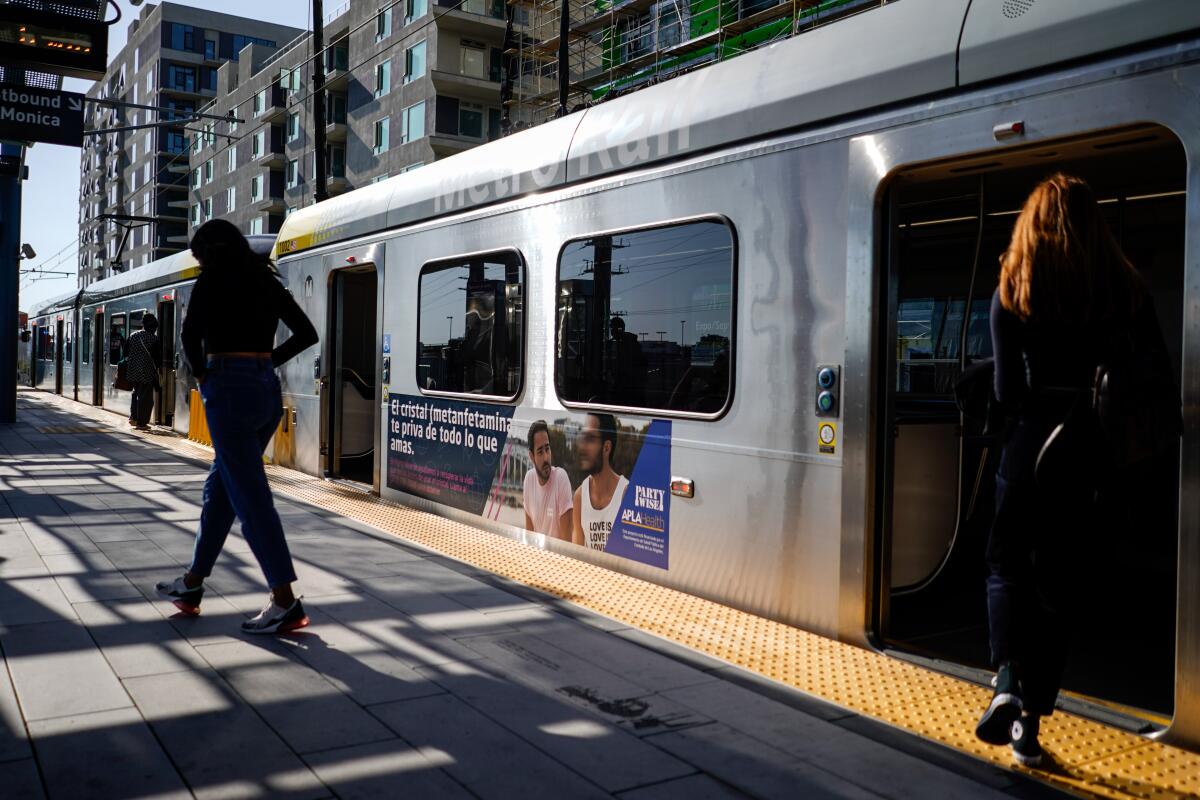
The three Democrats agreed that subsidies for the fossil fuel industry need to go — and that we need to spend the hundreds of billions of climate dollars from the Inflation Reduction Act wisely. Lee told me Congress must ensure that those dollars are spent most of all on communities long burdened by pollution and now suffering from climate-fueled heat waves, wildfires and storms.
She attributed her focus on environmental justice to her history growing up near a lead and copper smelter in Texas.
“So many people in my neighborhood — family members, friends — were getting lung problems and bronchitis,” Lee said.
It’s not my job to tell you whom to vote for. But I’d say there are two ways to look at this.
The first way is, all three Democrats are decent options on climate, so it shouldn’t be the issue that dictates your choice.
Despite the relative dearth of climate discourse on the campaign trail, I found Lee, Porter and Schiff to be thoughtful and well-versed. They all had broad talking points ready to go. But when I pressed them for specifics, they generally had specifics.
The other way to look at the race involves politics. A recent poll found that 25% of likely voters backed Schiff, with Porter and Garvey tied at 15% each and Lee trailing with 7%. The top two candidates will advance to the general election regardless of party affiliation. So if you want to see a more robust, more nuanced climate debate between now and November, the best move might be to vote for Porter, to increase the odds that she moves ahead of Garvey and squares off against Schiff.
Polls can be wrong, of course. So take my musings with a grain of salt.
In case you’re wondering about Garvey, by the way? The former Dodgers first baseman did acknowledge at last month’s debate that climate change is real. But he didn’t offer any specifics on what he’d do about it, instead defending oil and gas and saying, “You don’t put a stress on the economy of this country” by requiring a transition to electric cars.
I’m a huge Dodgers fan. But tackling the climate crisis is more important to me than honoring a baseball legend.
ONE MORE THING
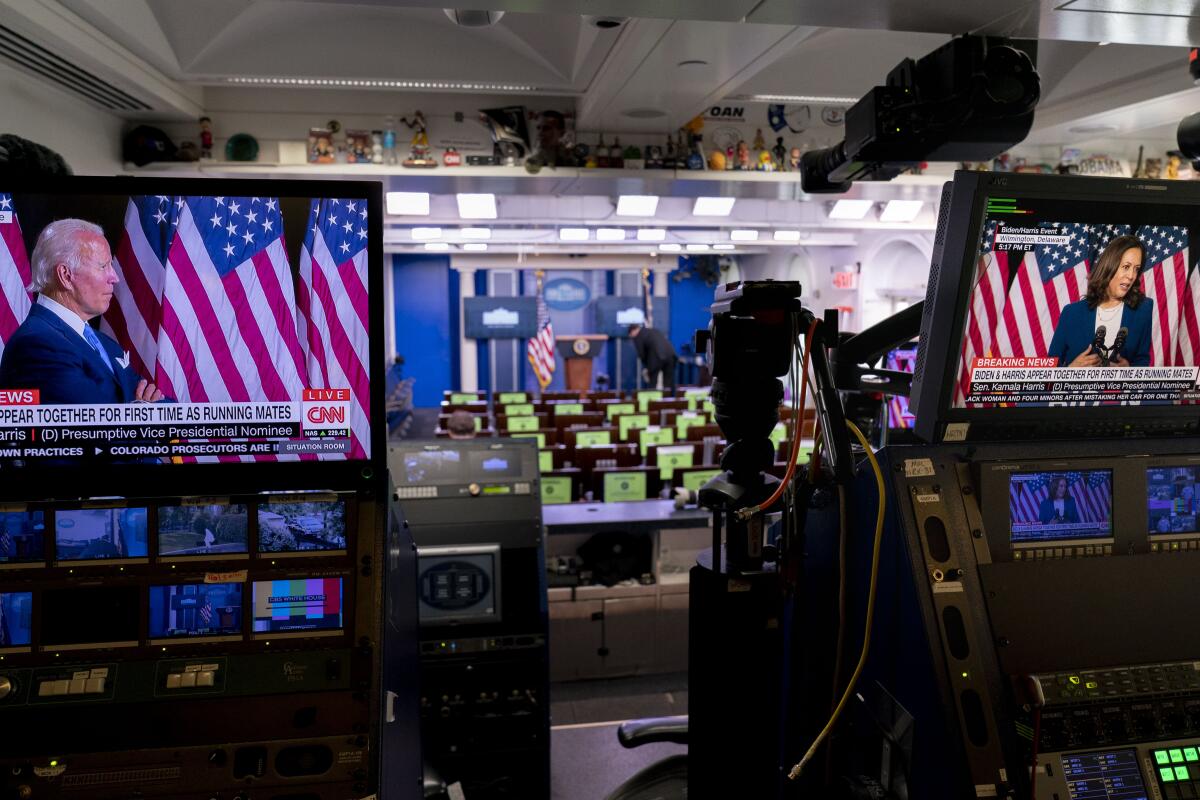
If you’re a reporter looking to better feature climate in your election stories, Covering Climate Now is here to help. The journalism support group has a “Climate on the Ballot” weekly newsletter offering advice and sharing examples of strong coverage.
“By any reasonable journalistic standard, 2024 should be the year of the climate election,” the group’s co-founders wrote in the Guardian last week. “So far, however, the political press is covering the 2024 campaign as if climate isn’t on the ballot.”
My fellow journalists, let’s change the conversation.
This column is the latest edition of Boiling Point, an email newsletter about climate change and the environment in California and the American West. You can sign up for Boiling Point here. And for more climate and environment news, follow @Sammy_Roth on X.
Toward a more sustainable California
Get Boiling Point, our newsletter exploring climate change, energy and the environment, and become part of the conversation — and the solution.
You may occasionally receive promotional content from the Los Angeles Times.
